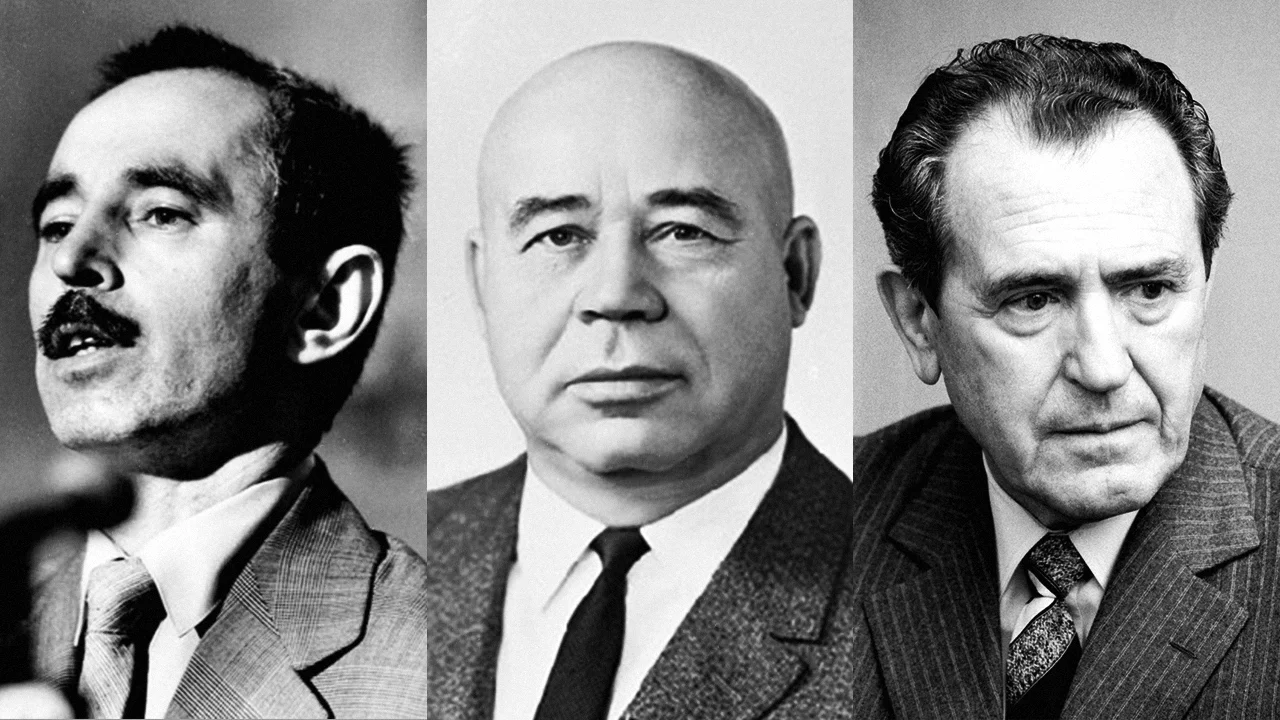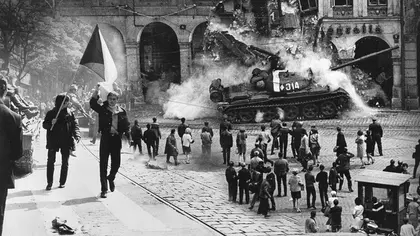Fifty-five years ago today, on Aug. 21, 1968, Soviet tanks suddenly rolled into the Czechoslovak capital, Prague. Within weeks, through the application of brute military force, Moscow managed to suppress, at least on the surface, that country’s striving for freedom. It had been reawakened by reforms holding out the prospect that the hitherto repressive communist system could be liberalized from within and replaced by “socialism with a human face.”
The images of the Soviet tanks being met by irate Czechoslovak citizens, and in many cases stopped in their tracks, sent a powerful message around the world. Not only about the heroism and tragedy of the Czechs and Slovaks, but about the enduring despotic and imperialistic nature of Soviet totalitarianism.
Moscow termed its invasion euphemistically as an “intervention” motivated by the desire to save Czechoslovakia from the clutches of the “evil” West, from fascism, capitalism, and so on. The views of the Czechoslovak population were not considered.
This was not the first time Moscow had sent in tanks to crush opposition in recalcitrant neighboring countries. It happened in East Berlin in 1953 and in Budapest in 1956. Soviet troops were to remain as de facto occupiers in the central and eastern European states Moscow had controlled since 1945 until the collapse of the communist system at the end of the 1980s.
The reverberations of what become known as the “Prague Spring” were felt far and wide. Many Ukrainian patriots followed the process of liberalization in neighboring Czechoslovakia with considerable interest and sympathy, though few dared to speak out openly.

How President Harris Would Handle US Foreign Policy in Europe and Asia
In May 1968, the Ukrainian political prisoner Valentyn Moroz – a historian whose protest writings vividly described the mechanics of totalitarianism and Russification, and exposed conditions in the Gulag – wrote an appeal to the head of the Communist Party in Ukraine, Petro Shelest, drawing a parallel between the situation in Czechoslovakia and Ukraine.
“The Communists of Czechoslovakia are demonstrating to the Communists of all countries the necessity of throwing overboard that which had had become a ballast, and opening the sluices to those forces which guarantee a future,” he wrote. “Will the Communists of Ukraine succeed in mastering this lesson?”
Two months later in Moscow, another Ukrainian, Red Army Maj. Gen. Petro Hryhorenko, who had become a dissenter and was to end up in a punitive psychiatric hospital, handed over a letter at the Czechoslovak Embassy expressing the belief that in the unlikely invent of a Soviet intervention, Czechoslovakia “could thwart a Soviet invasion easily” by blocking the roads on its borders and defending its airports. War would be a “lunatic act” he told a dissident friend.
But as we know, Soviet Leader Leonid Brezhnev went ahead with this “military adventure,” and thereby saved the Soviet empire from imploding. And in this he was strongly supported by Shelest.

From left to right: Valentyn Moroz, Petro Shelest, Vasil Bilak.
The Ukrainian leader had reasons of his own to feel threatened by what was happening across the border in Czechoslovakia. Ferment and dissent were on the rise in Soviet Ukraine. In the spring of 1968, he was confronted with the largest protest yet from the Ukrainian public about political repression and the “distortion of the nationalities question” in Ukraine – an appeal from 139 scientists, writers, artists and students.
Shelest had gone someway to placate the national intelligentsia and to support the greater use of the Ukrainian language and sense of Ukrainian identity, thereby broadening the constrictive Soviet parameters. But with Moscow irked as a result of this, he remained a hardliner in the political sphere. In 1968 he routinely denounced “reformism and revisionism” and émigré “treacherous Ukrainian counter-revolutionary elements” who “babble on about so-called independence.”
It is not surprising that Shelest was one of the Soviet hardliners who heeded the lessons of the Prague Spring, but not in the way that Moroz and his likeminded colleagues had hoped.
A former Ukrainian Communist, Pavlo Fedchenko later reported in 1992 that Shelest had told Ukrainian Communist officials at the time that Brezhnev himself had cold feet about launching the invasion. And that it was he, Shelest, who had persuaded the Kremlin leaders “that I and Czechoslovakia are neighbors and that I will not allow the disease to spread here.”
Shelest, according to his own diary, went as far as to obtain an “invitation” from diehard Czechoslovak Communist loyalists to Moscow to justify its military invasion.
He received it in Bratislava on Aug. 3, in a secret meeting with Vasil Bilak, a top party Slovak official and an ethnic Rusyn.
Shelest recorded: “In the evening, I finally met Bilak and we agreed that he would visit the public toilets at 8 p.m., that I would appear there at the same time, and he would then hand over the letter through our KGB officer Savchenko. And this is how it happened. We met ‘by accident’ in the toilets, and Savchenko furtively passed me an envelope containing the long-awaited letter.”
And so, the fate of the Prague Spring was ultimately decided in a Slovak toilet by the cooperation of a Ukrainian and Rusyn serving their Russian masters in Moscow.
This article draws on the author’s own book The Ukrainian Resurgence (1999) and an article by Luboš Veselý, “The Ukrainian Factor of the Prague Spring? Petro Shelest and the Czechoslovak Year 1968 in the Light of Documents of the Ukrainian Security Service,” which can be read here.
You can also highlight the text and press Ctrl + Enter






